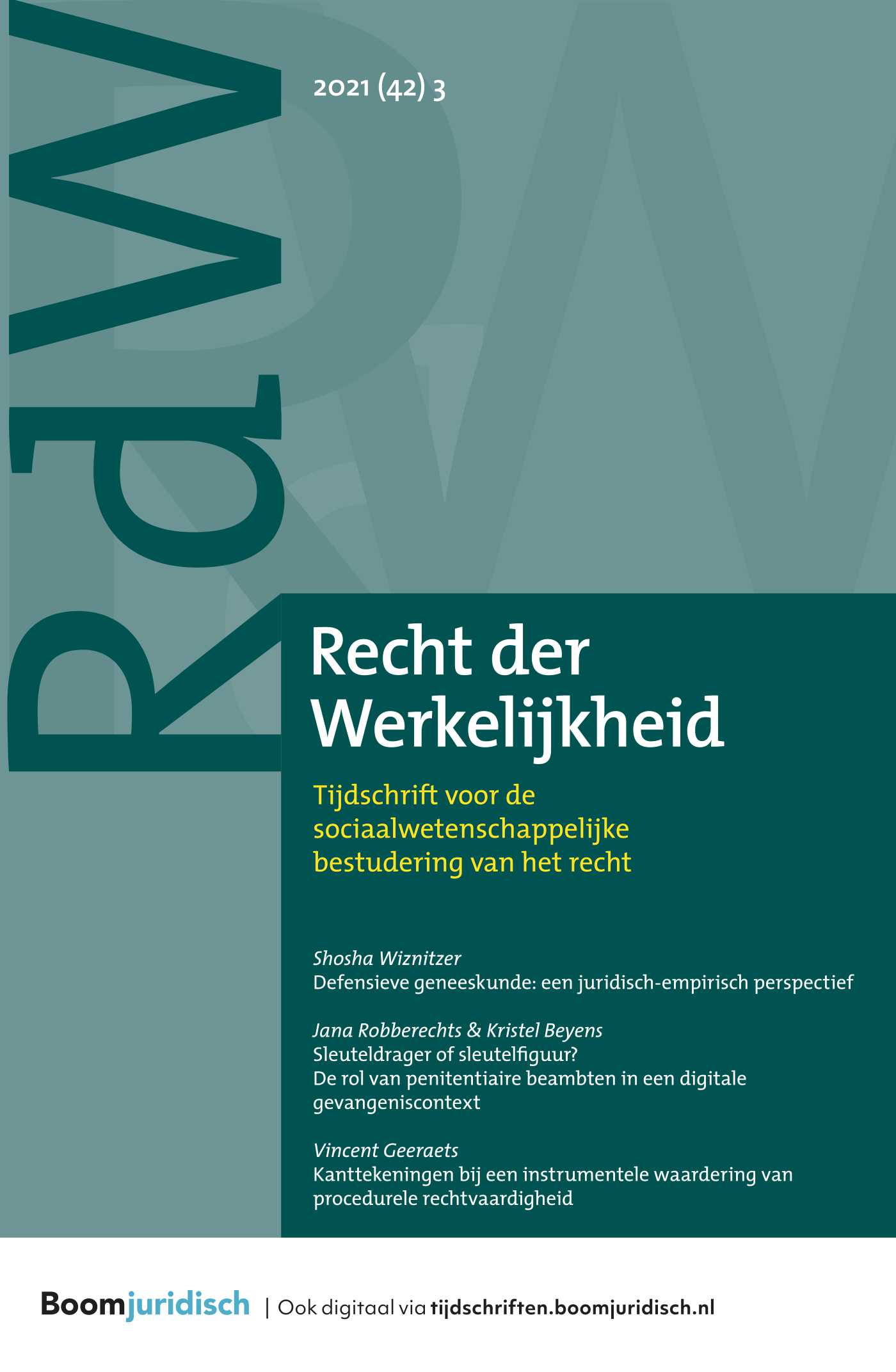|
Some scholars argue that a growing number of Dutch physicians practice defensive medicine. This implies physicians base their professional decisions primarily on a fear of being held liable. The main question of this article is whether empirical evidence corroborates the claim that Dutch medical liability law causes physicians to behave defensively. I argue that this is not the case. If we assume that the law influences physicians’ behavior, we must also assume physicians know the law. Empirical evidence shows this knowledge is limited. Furthermore, Dutch physicians tend to report low levels of defensive behavior. |


Recht der Werkelijkheid
Meer op het gebied van Algemeen
Over dit tijdschriftMeld u zich hier aan voor de attendering op dit tijdschrift zodat u direct een mail ontvangt als er een nieuw digitaal nummer is verschenen en u de artikelen online kunt lezen.
| Redactioneel |
De empirische bestudering van het recht |
| Auteurs | Danielle Chevalier |
| Auteursinformatie |
| Artikel |
|
| Trefwoorden | Defensive medicine/defensieve geneeskunde, Empirical legal studies/juridisch-empirisch onderzoek, Medical liability law/medisch aansprakelijkheidsrecht, Disciplinary law/medisch tuchtrecht |
| Auteurs | Shosha Wiznitzer |
| SamenvattingAuteursinformatie |
| Artikel |
Sleuteldrager of sleutelfiguur?De rol van penitentiaire beambten in een digitale gevangeniscontext |
| Trefwoorden | Street-level bureaucracy, Prison officer, Digitalisation, Discretion, Prisoner’s rights |
| Auteurs | Jana Robberechts en Kristel Beyens |
| SamenvattingAuteursinformatie |
|
While research has increasingly focused on the role of digitalisation in prisoners’ detention experiences, the impact of the digitalisation of the prison regime on the discretionary power of prison officers has been understudied. By using an ethnographic approach in one digital Belgian prison, qualitative interview data are used to investigate the prison officer’s coping strategies in response to the digitalisation of prison life. It is found that the gatekeeping role of prison officer’s has been partly stripped away but also that the impact of digitalisation on the prison officer’s discretionary power depends on how digital technologies are implemented. Moreover, the study reveals that not all official goals regarding the digitalisation are met and highlights the need of supporting prison officers when implementing new technologies in prison. |
| Artikel |
Kanttekeningen bij een instrumentele waardering van procedurele rechtvaardigheid |
| Trefwoorden | Procedural justice, Empirical-legal research, Fact-value distinction, Consequentialism, Deontology |
| Auteurs | Vincent Geeraets |
| SamenvattingAuteursinformatie |
|
Procedural justice has been at the forefront of empirical legal research in the Netherlands in past years. One of the major goals of this research is to find out what the effects are of the perception of procedural justice. In this article, I argue that the notion of procedural justice is deontological in nature. It has an intrinsic value, which means that it cannot be weighed against other interests. This is recognized in law: people have a right to a fair trial. However, since in social scientific research the focus is on the effects of procedural justice, researchers treat this concept (also) as a consequentialist notion. It is thought of as a means which can serve some useful end. My aim is to assess whether this way of valuing procedural justice can be considered acceptable. An important upshot of my discussion is that conducting research into procedural justice implies a normative stance. Finally, I suggest ways in which an all too instrumental approach to procedural justice can be avoided. |
| Forum |
|
| Auteurs | Jiska Ogier |
| Auteursinformatie |
| Forum |
|
| Auteurs | Erwin Dijkstra |
| Auteursinformatie |
| Recensies en signalementen |
Grondbeginselen van empirisch-juridisch onderzoek uiteengezet |
| Auteurs | Albertjan Tollenaar |
| Auteursinformatie |
| Recensies en signalementen |
De ELS-encyclopedie op weg naar de toekomst |
| Auteurs | Leny de Groot-van Leeuwen |
| Auteursinformatie |
| Werk in uitvoering |
Water bij de wijn: alcohol, legitieme autoriteit en lokale opvattingen over de staat in ruraal Oeganda |
| Trefwoorden | Alcohol, law, clan councils, the state, Uganda |
| Auteurs | Danse Anna Maria de Bondt |
| SamenvattingAuteursinformatie |
|
Those people in charge of rule creation, implementation or dispute settlement are often imagined to work with – or relate in some way to – the state. The state is often imagined to encompass full authority on law and governance over the people living in a specific space-time dimension. However, in everyday life, practices that intrinsically connect to the creation of ‘the state’ are not necessarily connected to those actors or institutions representing it, nor do they necessarily help to create or maintain the state’s positive image. In this dissertation I ethnographically study the everyday practices of law and governance in rural Uganda by using a relational approach. I follow lower-level government servants, police officers and clan councils in their work and show how colloquial conceptions of tradition, modernity and (un)officialdom blur what constituted the state, (state-)law and legitimate authority. I use alcohol as a lens through which to study these governance practices as its ambiguous status in decision-making practices of clans opens up a window through which discussions on legitimate authority, governance and the state can be explored. |

